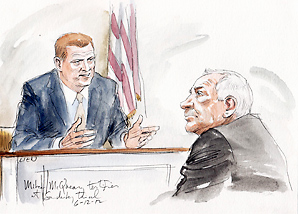Once vilified, McQueary now doing right thing at Sandusky trial
Multiple accusers -- now grown men -- have broken down on the witness stand describing acts of forced oral sex and intercourse, threats and manipulation. Another witness left the courthouse with a black bag over his head, such, presumably, was his level of shame and embarrassment. We respect the judicial process and the presumption of innocence. Yet calling these witnesses "alleged" victims, as we must absent a verdict, nonetheless feels callous.
While no one would dare imply that his suffering is akin to a sexual assault victim's, another figure damaged in this sordid scandal took the stand on Tuesday, bolstering the prosecution's case: Mike McQueary.
It is McQueary, of course, who has played a -- perhaps, the -- crucial role in the Penn State narrative since the story broke last November. Then a graduate assistant for the Nittany Lions football team, McQueary was at the Lasch Football Building in 2001, when he heard what he described as a "skin-on-skin smacking sound" coming from the shower facility. Using a mirror, McQueary could see Sandusky standing behind a boy "propped up against a wall" performing a sexual act. Though almost 6-feet-5 inches, and 30 years Sandusky's junior, McQueary did not physically intervene or call the police. He chose only to slam a locker door, as he testified, in hopes of breaking up the incident.
The following day, after conferring with his father, McQueary reported what he saw to Joe Paterno, the team's revered coach. Paterno then waited another day to speak to the athletic director. The athletic director then talked to a superior, who relayed the incident to university president Graham Spanier. The allegation lost severity with each retelling. An act initially described as man-on-boy intercourse had become horseplay that made a witness "uncomfortable."
Initially, McQueary was cast as a villain -- the embodiment of the banality of evil. How could he not have confronted Sandusky that evening? Or at least called the cops? And how could he have remained silent as he saw Sandusky in the same football facility and at various functions, sometimes in the company of young boys?
As of last fall, McQueary was a prominent Penn State assistant coach. Since then, he has been placed on administrative leave by the school. His coaching career -- to say nothing of his reputation -- is in tatters.
But recently, McQueary has become, at a minimum, a more complex figure. As we have learned more about the insularity of the Penn State football program, McQueary's inaction that evening becomes, if not altogether understandable, at least somewhat easier to comprehend.
What's more, several news outlets have reported that former Penn State vice president for finance and business Gary Schultz kept a secret file on Sandusky that included emails among administrators about inappropriate behavior.
This not only contradicts previous statements by administrators; it suggests that McQueary's initial statements in 2001 were more forceful and clear than they've been portrayed.
Asked about the incident in the trial, McQueary admitted, "I've said repeatedly I didn't do anything physically to stop it. It's been well publicized ... Did I pull the boy out of there, did I physically go and assault anybody, did I remove him? ... Physically [I] didn't remove the young boy from the shower or go and punch Jerry out." McQueary went on to assert that, after 2001, he was so repulsed by Sandusky he couldn't occupy the same room, so much so that other members of the football staff took notice. Why, he was asked, didn't he quit? "I would never resign from Penn State University," he said.
As heart-rending as the victims' testimony has been, McQueary's firm and unambiguous account could be just as damaging to Sandusky. The defense will argue that the accusers have embellished their stories, motivated by the financial gain of a civil suit.
In the case of McQueary, now 37, it's hard to argue there's a profit motive. Plus, having another adult corroborate the accounts of the many witnesses undermines the defense's claims of conspiracy among the victims.
More than a decade ago, McQueary's failure to act with sufficient conviction may have permitted a serial sexual abuser to continue on. If McQueary's honest testimony enables a jury to convict Sandusky, at least he will have made the most of his second opportunity to do the right thing.





